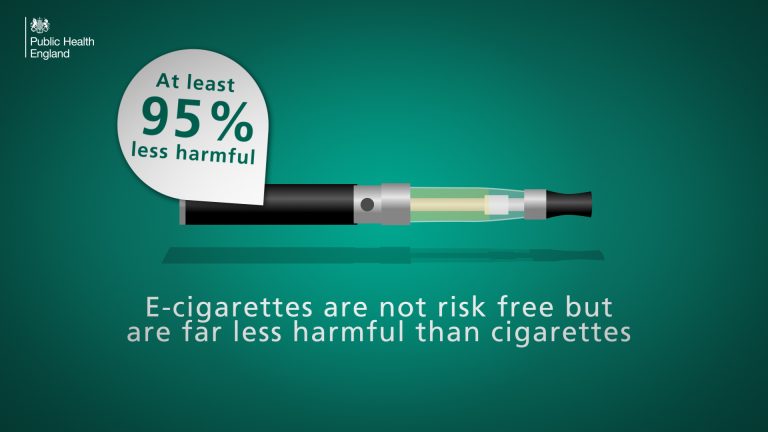In the UK, the authorities support many smoking cessation methods, including e-cigarettes. The aim is to reduce smoking in a short time. And vejpning plays a key role.
Quitting smoking is an arduous journey. Most smokers want to quit, but statistics show that most people try to quit without help, ends with relapse.
In the UK, the focus is on authorities are therefore fully committed to supporting all methods of smoking cessation, including e-cigarettes. Public Health of England wants to reduce smoking from the current 15% to below 5% by 2030. And electronic cigarettes are an important part of that effort, according to the Department of Health.
It is not entirely uncontroversial. E-cigarettes are a relatively new technology that has only been on the market for just over 10 years. And the health effects of long-term use are not fully known.
"When e-cigarettes appeared on the market 10 years ago, we became very interested in how the technology could be used"
This is according to John Newton, Head of Health Promotion at the UK Department of Health.
"At first, of course, many were hesitant. But we collected data. And it turned out that e-cigarettes were successfully used by smokers to quit smoking" he tells the CNBC television channel.
"Pretty soon it became clear that e-cigarettes had few measurable, harmful, health effects compared to regular cigarettes. They are not completely risk-free, but for a smoker, the electronic cigarette poses significantly lower health risks" says John Newton.
Public Health of England has compiled and analyzed an extensive body of research on e-cigarettes since 2015. On a global level. The document is a live report which is updated annually as new data is published. Currently, the report summarizes over 2,000 studies, with up to 500 more added each year. The report "E-cigarettes - an evidence update" is a benchmark for political decisions and health promotion policies in the country. It also provides information for doctors, midwives, social workers and other health and wellness organizations. The message is that e-cigarettes are 95% safer to use, compared to cigarettes.

"We wanted to make it clear that vejping is far less harmful than smoking. Tobacco smoke contains tar, carbon monoxide and thousands of other toxic substances that cause cancer, cardiovascular disease and nerve damage; it is among the absolute worst things you can do to your body. Reducing the risk of harm by 95% is life-changing." Says John Newton.
The authority has been criticized for its clear position. A recurring argument is that knowledge about e-cigarettes is currently weak. But this is something John Newton disagrees with.
"The vapor from an e-cigarette contains very few of the harmful substances of smoke. Vapors have similar values to someone using classic nicotine medicines. It is of course impossible to put an exact figure on health and safety, but when we say '95% safer' it is as close as we can get. Above all, the message is clear." says John Newton.
In 2019 and 2020, the authorities, together with other state-supported non-profit organizations, have launched several campaigns on the benefits of e-cigarettes in smoking cessation. The Public Health Agency continuously promotes research to encourage smokers to switch to e-cigs.
Today (2019), nearly 2.5 million people regularly use e-cigarettes in the UK. Public Health of England notes that there are two groups that vejpar: those who use e-cigarettes to cut down on smoking and those who have stopped smoking completely.
In the summer of 2019, vejpshoppar also opened in two of the country's hospitals. At the same time, smoking was completely banned on hospital premises. The aim was clear: smokers would be encouraged to switch to e-cigarettes or nicotine replacement therapy - or not to smoke at all.

One issue that has raised debate is the use of e-cigarettes among young people. Alarmist reports from different countries suggest that use has "exploded" and that young people are getting hooked on nicotine in a way they wouldn't otherwise have done were it not for e-cigarettes. In England, however, research by Public Health of England suggests otherwise.
"I think what causes confusion and disagreement between researchers is that they are looking at too different types of phenomena. Young people will inevitably try new things and if you only look at those who ever tried an e-cig, the numbers are obviously very high. However, if you look at regular use and how many people use them, for example, every week. Then we see a completely different pattern" says John Newton
He wants to play down concerns that e-cigarettes would lead to a new generation of smokers. Rather, the research shows a different trend: that vejping is slowly replacing smoking among young people.
"Four percent of young people use e-cigarettes somewhat regularly. The majority of these are already smokers or former smokers. We also know that the proportion of never smokers who now use e-cigarettes is minimal, less than one percent. These are fairly static figures as well, they look the same over time" says John Newton.

In many countries e-cigarettes and vejping are still viewed with suspicion, by both politicians and health organizations.
In the UK, the situation is different. In addition to broad political support through the Department of Health, organizations like Cancer Reasearch UK, Actions on smoking and health (ASH) and British Heart Foundation actively informing and researching on e-cigarettes. The basic position is that alternative forms of nicotine delivery are an effective method of smoking cessation and that vejping has an obvious place to fill for some smokers.
"Vaping has proven to be the most popular method. And the research we do shows that e-cigarettes, preferably in combination with counseling, work better than traditional nicotine medicines" says Linda Bauld, Professor of Public Health Sciences at the University of Edinburough, to BBC's Breifing Room (a podcast about vejpning and health risks)
Behind the reasoning is a philosophy of health science, "harm reduction", or "Harm reduction" which is the international term. Harm reduction as a method has long been discussed in public health research, particularly in the treatment of heavy drug dependence.
The principle is that the user does not change their behavior, but instead reduces the risks and harms caused by the behavior.
Clean syringe distribution to drug users and methadone programs are some examples of successful harm reduction.
For smokers, it's about alternative ways of using nicotine: nicotine patches, nicotine gum, and indeed snus, are harm reduction in action. Not surprisingly, the UK is a world leader in this approach.
"We are very clear about our views on nicotine. Nicotine is a stimulant, it is an addictive substance, but it does not cause cancer and it is not a direct cause of heart disease. We have long offered nicotine for smoking cessation, including to pregnant smokers, something that is not done in other countries. Often the risks of nicotine are linked to the addiction itself and health risks are seen that science simply does not confirm" says Linda Bauld.
According to Linda Bauld nicotine has a long-standing reputation as harmful precisely because of its smoking and its widespread harmful effects.
"Smoking is so harmful that nicotine is often confused with the properties of smoke. This is also the case in the UK. The general perception is that nicotine is very harmful and that it causes cancer, although research clearly shows that this is not the case. Our authorities are working hard to launch e-cigarettes and make them available to smokers who cannot or do not want to quit smoking otherwise. At the same time, we have strict legislation, through the European Tobacco Products Directive (TPD), to prevent non-smokers and young people from taking them up. But it is a balancing act where several health interests need to be safeguarded." says Linda Bauld.
The number of smokers has fallen rapidly in the UK. Local stop-smoking centers and government information campaigns are clearly a reason for this, says Linda Bauld.
Together with a encouraging attitude to e-cigarettes.
"We have an evidence-based policy on harm reduction. It gets some criticism, but I think it's important to stay the course. Because it works. Smoking is declining at a rapid pace. Smoking among young people is at an all-time low. That's because we've invested in research on how smokers behave in the market and met their needs. Moving towards a smoke-free society", says Linda Bauld to the BBC.





Very good facts that fit nicely